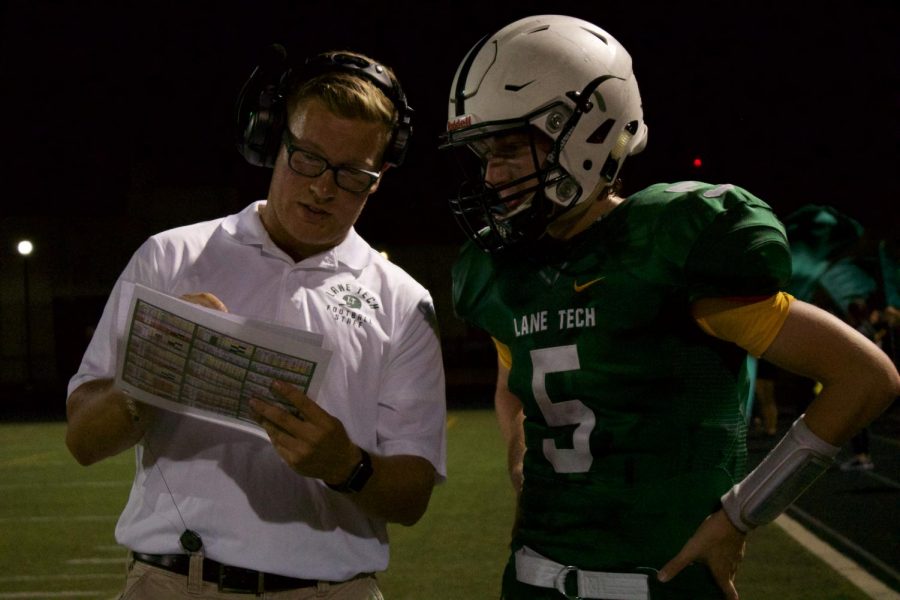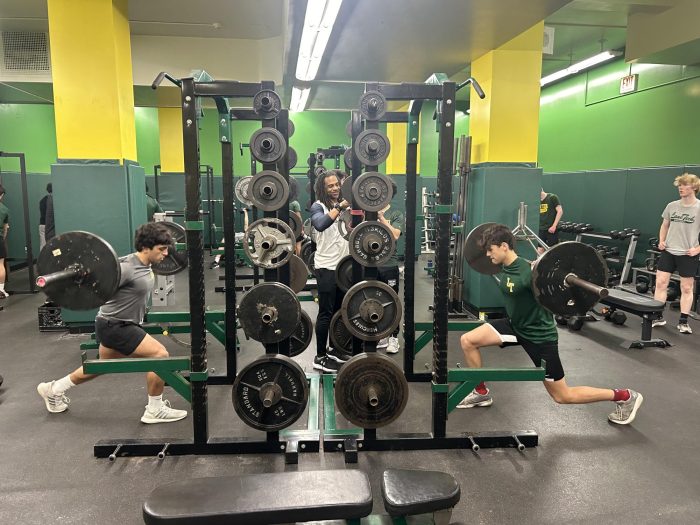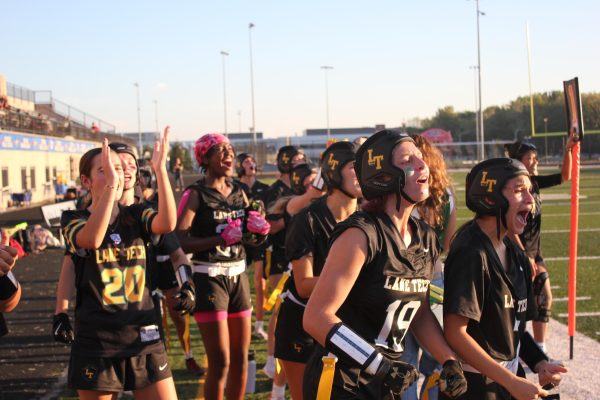Sideline impact goes beyond win-loss records
Assistant Varsity football coach Pat Czerwiec goes over plays with senior quarterback Luke Calkins during the team’s game against Simeon on Sept. 15. (Photo courtesy of Stefan Rebic)
At every practice and every game the effects that a coach can have from the sideline boil down to the effort the coach puts in behind the scenes to hold their team to a certain standard. How coaching efficiency is measured varies at different levels of skill.
Occasionally varsity sports play games on non-school days and overcoming the mental distractions can sometimes be an area of concern for players.
The girls varsity basketball team faced off against Addison Trail on Nov. 16. Prior to the game, the team showed a lack of focus in the locker room and during the bus ride to the venue, according to head coach Megan Molloy.
Molloy, who is in her first season coaching the varsity level, defined this loss as a moment that showcases the style of coaching she wants to use with her team.
“My coaching point was that you have to be ready from the beginning,” Molloy said. “You can say you want to win, but that doesn’t always mean you’re ready to fight in the game right away.”
This is just one of the ways Molloy said she goes beyond thinking about wins when coaching her tea. This comes as the result of no requirements being set by Lane administration for a coach’s record.
“There were no concrete goals; they want to make sure you have a winning team, but that’s not your only goal,” Molloy said. “They want you to instill values in these girls that are not just black and white.”
Molloy did say that she realizes that winning is always going to be important to the players when they think of their coach and their season.
“At the end of the day, if the girls are going to be happy with their season, it’s probably because they had a winning season,” Molloy said.
Molloy also said that she thinks it would be fair to judge a coach by whether players are developing in the coach’s system.
Despite the fact that coaches at Lane have objectives other than winning games, the school is still successful in that department as well.
Lane being called the “School of Champions” is founded in the tradition of producing championship winning seasons by varsity teams. According to Lane’s website, the school has won over 500 city championships in its history.
A legacy of success can bring added pressure for players and especially the coaches in charge of their respective program; however this is not the case with former Athletic Director Brian Hofman.
“There is all different definitions of champion; sometimes programs on a yearly basis aren’t winning as many games as they want to win, but that doesn’t mean they are not a champion,” Hofman said.
According to Hofman, the definition of a champion goes beyond winning and losing.
“It’s a champion on the court with sportsmanship, it’s a champion in the classroom with academics, it’s a champion in the Lane Tech community,” Hofman said.
At the collegiate level, some of these same values are important to the college teams, but there tends to be a slew of coach firings when expectations are not met from season to season, especially with top football and basketball programs.
According to the Sporting News, in the last few months, football coaches at top Universities such as Nebraska, UCLA, Tennessee and Rice have been relieved of their duties.
In the case of Butch Jones at the University of Tennessee, he had coached the program to three straight nine-win seasons before going 4-6 this season and ultimately being let go. In college sports, it is common for coaches at Division I schools to be fired, even after multiple college football bowl game appearances or NCAA basketball tournament visits, if the program slips.
It is important to consider that there is a greater investment placed in college athletics. According to USA today, as of 2013, some schools spent in excess of $91,000 per athlete, which is seven times higher than the amount spent per student.
Looking beyond finances, the contrast in the definition of a successful coach at Lane compared to major universities is shown through past hiring decisions.
Hofman admitted that winning has also been a factor at Lane, but it was never the number one factor in hiring a new coach during his tenure, and an example would be the hiring of head varsity football coach Tony Faltin.
“We also wanted to have someone who was going to be a positive influence on our student athletes, somebody who believed in a positive aspect of coaching,” Hofman said. “Someone who was going to be aware of our academic standards and be able to maintain and increase the standards of our athletic department.”
Coach Faltin has been in charge of the football program for three seasons and said he feels like they are making progress in many areas. Part of his program that he hopes will lead to success is centered around the motto he brought with him. Faltin said that he models his program after the Naval Academy. He implemented the acronym L.A.N.E, which represents leadership by example, accountability, nobility and excellence. This is similar to Navy football’s motto LEAD.
Faltin stays true to his philosophy by recognizing the need for players to stay out of trouble and be able to play come gameday.
“We are not good enough to sit players. We can’t afford to have kids getting in trouble because we are just not that good to put players on the sideline,” Faltin said.
Faltin said the team has had about 40 athletic suspensions during his three years so far as head coach. This is why he says that it is his focus to help put his players in a position to succeed before the team can reach beyond the 4-5 record they have had each of the last three seasons.
“It’s frustrating because we have really good kids here, we have resources here, we have tools,” Faltin said. “I come from schools where we didn’t have the resources we have here, and I just want to make sure we’re taking advantage of them.”
Faltin said he is happy to coach at a school with a rich tradition, and he would step aside anytime the school felt he wasn’t doing the best he could for his team.
“Something I said before to administration is that if you feel I’m not putting these kids in a position to be successful, then I’d be more than happy to hang my hat, because ultimately that’s my job. To build them morally, mentally and physically,” Faltin said.
Your donations directly fund the Lane Tech student journalism program—covering essential costs like website hosting and technology not supported by our school or district. Your generosity empowers our student reporters to investigate, write, and publish impactful stories that matter to our school community.
This website is more than a publishing platform—it's an archive, a research tool, and a source of truth. Every dollar helps us preserve and grow this resource so future students can learn from and build on the work being done today.
Thank you for supporting the next generation of journalists at Lane Tech College Prep!

I am a senior and a Journalism 2 student here at Lane. I have a strong interest in sports journalism, but have branched out to stories with a variety of...




